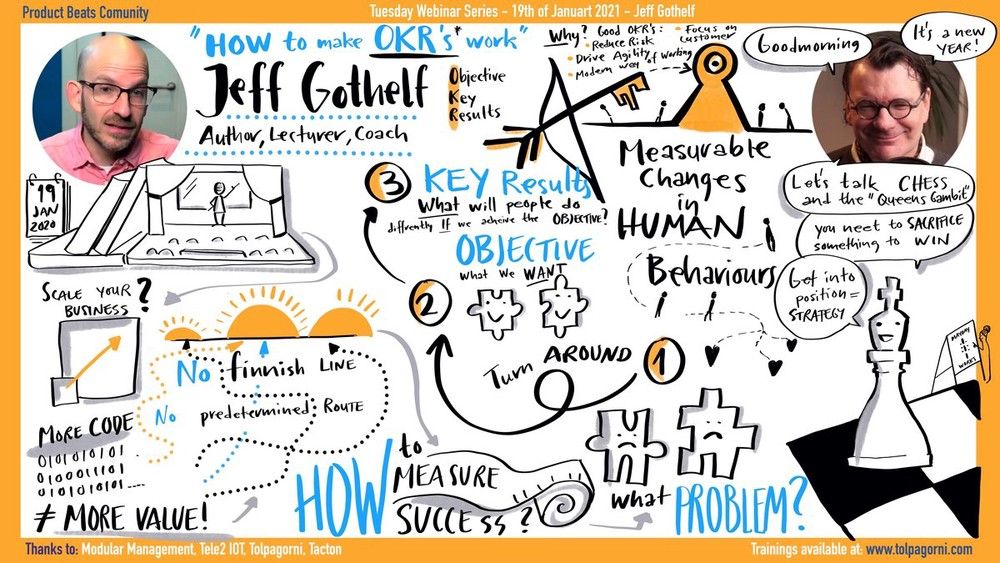Episode 41: OKRs w/Jeff Gothelf
19 January, 2021 / Host: Magnus Billgren
Why OKRs Are Essential for Business Success in the Age of Continuous Software Development
In today's fast-paced business landscape, organizations are constantly looking for ways to improve and stay competitive. One approach that has gained traction in recent years is the use of OKRs (Objectives and Key Results). OKRs are a simple and effective method of setting and tracking progress towards specific, measurable goals. However, as Jeff Gothelf explains in this episode of the Productbeats Show, implementing OKRs can be a challenge for organizations. In this post, we will explore the importance of continuous software development, the challenges of measuring success, and strategies for overcoming these challenges.
The Importance of OKRs in Continuous Software Development
- Software development is no longer static, but continuous. Organizations must adapt their approach to keep up with the competition.
- Organizations must shift their focus from being a software factory to delivering value to customers.
- Further, having effective goal setting can better motivate employees.
Continuous software development is important because it allows organizations to continuously improve their products and services. The traditional approach of shipping code at the end of a project no longer applies. Instead, organizations must learn from their systems and adjust course based on what they're learning. This requires organizations to be agile and to have a culture that supports experimentation and learning.
Challenges in Measuring Success with OKRs
- The traditional measure of success, which is the delivery of code, no longer matters.
- Organizations need to focus on whether the code delivered value and how it improved the product or service for the customer.
Measuring success in the age of continuous software development can be challenging. The traditional measure of success, which is the delivery of code, no longer applies. Organizations must shift their focus to measuring outcomes rather than delivery. This requires organizations to gather and act on customer feedback. Additionally, with continuous development, it is necessary for a company to change how they are celebrating success from deliveries to achieving outcomes. This can be a challenge for organization as it requires a change in mindset and culture.
Strategies for Overcoming Challenges with OKRs
- Shift the focus from delivery to outcomes.
- Embrace a culture of experimentation and learning.
- Adopt a sense-and-respond approach by being customer-focused and gathering and acting on customer feedback.
Jeff Gothelf's presentation in this episode highlights the importance of continuous software development and the need to shift away from traditional measures of success. He emphasizes the need for organizations to adapt to the continuous development mindset in order to remain competitive in today's market. He encourages organizations to focus on delivering value to customers and continuously learning and adjusting course based on feedback. By embracing a culture of experimentation, learning and adopting a sense-and-respond approach, organizations can overcome the challenges of implementing OKRs and continuously improve their products and services.
In summary, as the business world continues to evolve at a rapid pace, it's essential for organizations to stay ahead of the curve. OKRs provide a framework for setting and tracking progress towards specific, measurable goals. However, implementing OKRs can be a challenge for organizations, particularly in the age of continuous software development. By understanding the importance of continuous software development, the challenges of measuring success, and strategies for overcoming these challenges, organizations can improve their chances of success.
As you can see, adopting a culture of continuous learning and experimentation is crucial to staying competitive in today's fast-paced business landscape. If you're ready to take the next step and make it official, consider enrolling in our Certification Program. Our program is backed by decades of research and is the only Product Management Certification Program with the seal of approval from the ISPMA foundation. It's a fantastic opportunity to advance your career and build your skills.
You might also enjoy watching...
Copyright © 2026 ProductBeats AB

Get The Program Brochure
Submit the form below to have The Program Brochure delivered to your inbox
The title of the notification
The descriptive text of the notification


